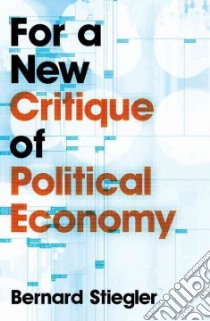- Libreria
- >
- Libri in lingua
- >
- Economia, finanza e management
- >
- Economia politica
For a New Critique of Political Economy - 9780745648040
Un libro in lingua di Bernard Stiegler Ross Daniel (TRN) edito da Polity Pr, 2010
- € 13.40
- Il prezzo è variabile in funzione del cambio della valuta d’origine
"Passionate, rigorous, and fundamental, this is a key part of Stlegler's urgent and vitally important diagnosis of our contemporary predicament." Martin Crowley, University of Cambridge
"Stlegler's critique of political economy provides the theoretical resources to understand how technologies have reconstituted memory and subjectivity, renewing modes of domination and generating new forms of collectivity. In the midst of a crisis of Western neo-llberalism, this path-breaking book could not come at a more opportune time. Eat your heart out Slavoj Zizekl" Scott Lash, Goldsmiths, University of London
"Stiegler's writings emerge as the real world antidote to the utoplan and apocalyptic traces of post-politics in figures like the `multitude,' `biopolitics,' or Zizek's recent Christo-communist imaginary. He is one of the few contemporarles capable of addressing a new era whose epistemological mutations are just beginning to appear." Tom Cohen, State University of New York
The catastrophic economic, social, and political crisis of our time calls for a new and original critique of political economy - a rethinking of Marx's project in the very different conditions of twenty-first-century capitalism.
Stiegler argues that the proletarian must be reconceptualized as the economic agent whose knowledge and memory are confiscated by machines. This new sense of the term "proletarian" Is best understood by reference to Plato's critique of exteriorized memory. By bringing together Plato and Marx, Stiegler shows how a generalized proletarianization encompasses not only the muscular system but also the nervous system, and that it embraces not only workers but also consumers. The development of digital and network technologies has exacerbated these trends and has captured more Intensively the minds of everyone, Stiegler argues, however, that these technologies contain other possibilities, and that the key challenge today is to use these technologies creatively to remake our systems of production and consumption.
This text offers an excellent introduction to Stiegler's work, while at the same time representing a political call to arms in the face of a deepening economic and social crisis.
Informazioni bibliografiche
- Titolo del Libro in lingua: For a New Critique of Political Economy
- Autori : Bernard Stiegler Ross Daniel (TRN)
- Editore: Polity Pr
- Data di Pubblicazione: 09 Novembre '10
- Genere: SOCIAL SCIENCE
- EAN-13: 9780745648040


